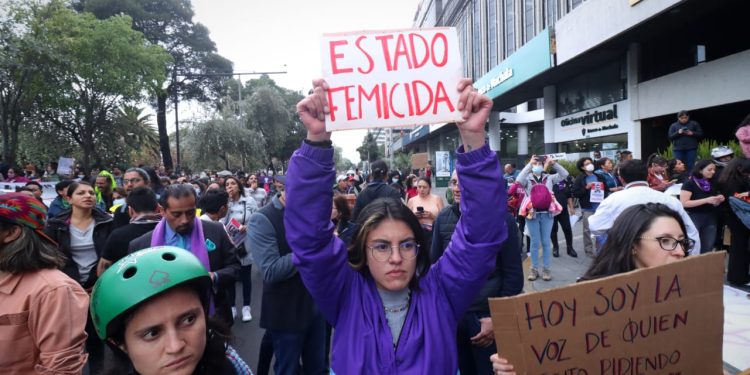NEWS CENTER – On September 21, the Ecuadorian national government reported that 34-year-old lawyer María Belén Bernal, who had been missing for 10 days, was found dead. Bernal’s remains were found on the Casitagua hill, located five kilometers from the Quito Police Training School, from where she disappeared on September 11 after visiting her husband Lieutenant Germán Fernando Cáceres. Cáceres, the primary suspect in her murder, is on the run.
Bernal’s murder marked the latest femicide in a country plagued by violence against women. According to the Aldea Foundation, which tracks crime in the country, between January 1 and September 3 Ecuador recorded 206 cases of femicide. Bernal’s case, in which the police are directly involved, has served as the last straw and sparked widespread outrage against the state.
President Guillermo Lasso, through his Twitter account, lamented Bernal’s death and promised that those responsible would be punished. “With deep pain and indignation I regret to report that María Belén was found. Her femicide will not go unpunished and all those responsible will be brought to justice. My solidarity with her mother Elizabeth and her little son,” he tweeted.
[envira-gallery id=”22823″]
Nevertheless, the nationwide feminist movement and social organizations, which had been demonstrating since September 12 demanding Bernal’s safe return, denounced the police, demanding Interior Minister Carrillo’s resignation over irregularities in the investigation of the case.
On September 21, in Quito, hundreds of citizens gathered outside the Agricultural Ministry to partake in a sit-in organized by Bernal’s mother. After demonstrating there for a few hours, they marched to the Police Headquarters, demanding justice for Bernal and conviction of Cáceres. The protesters raised slogans such as “Murderers, murderers, murderers,” “Police kill, Femicidal State,” “Get out Carrillo, get out,” “Justice for Belén,” “The police don’t take care of me, my friends take care of me,” “I knew it, I knew that femiciders are taken care of by the Police,” among others. The protesters then peacefully demonstrated outside the Police Headquarters, continuing until late into the night.
People protested in front of the police station on the night of 22 of september:
On September 22, Bernal’s family and friends bid farewell to her. A large number of people attended the public wake, organized at the Theater of the Central University of Ecuador in memory of Bernal, to pay homage to her, and to express their support for her family. Members of various feminist collectives, including Ni Una Menos (Not One Woman Less), placed a purple color flag on her coffin and pledged to continue fighting. Within the Latin American feminist movement, purple signifies justice and dignity.
Bernal’s mother Elizabeth Otavalo, in a press conference from the university, stated that her daughter’s femicide was “a state crime.” She said that her daughter’s body was found 12 days later, “circumstantially behind the Police School, which she entered on September 11.”
“My daughter is a victim. She died inside the Police High School, therefore, it is a state crime. My daughter is [symbolically] going to fight for each and every woman, she declared.
Otavalo added that her daughter’s murder “cannot go unpunished” and said that the day marked “the beginning of a new struggle.”




